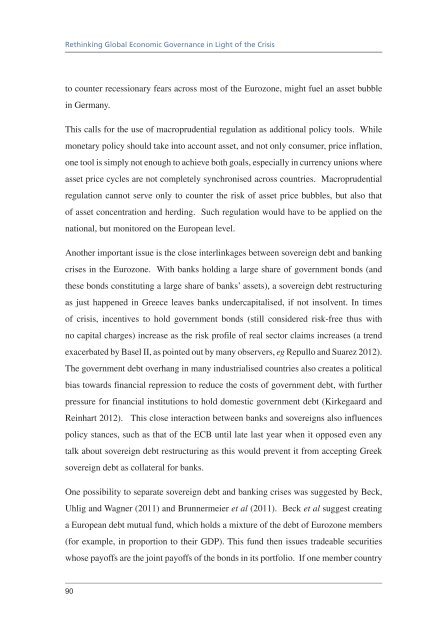Download PDF - Vox
Download PDF - Vox
Download PDF - Vox
- No tags were found...
Create successful ePaper yourself
Turn your PDF publications into a flip-book with our unique Google optimized e-Paper software.
Rethinking Global Economic Governance in Light of the Crisisto counter recessionary fears across most of the Eurozone, might fuel an asset bubblein Germany.This calls for the use of macroprudential regulation as additional policy tools. Whilemonetary policy should take into account asset, and not only consumer, price inflation,one tool is simply not enough to achieve both goals, especially in currency unions whereasset price cycles are not completely synchronised across countries. Macroprudentialregulation cannot serve only to counter the risk of asset price bubbles, but also thatof asset concentration and herding. Such regulation would have to be applied on thenational, but monitored on the European level.Another important issue is the close interlinkages between sovereign debt and bankingcrises in the Eurozone. With banks holding a large share of government bonds (andthese bonds constituting a large share of banks’ assets), a sovereign debt restructuringas just happened in Greece leaves banks undercapitalised, if not insolvent. In timesof crisis, incentives to hold government bonds (still considered risk-free thus withno capital charges) increase as the risk profile of real sector claims increases (a trendexacerbated by Basel II, as pointed out by many observers, eg Repullo and Suarez 2012).The government debt overhang in many industrialised countries also creates a politicalbias towards financial repression to reduce the costs of government debt, with furtherpressure for financial institutions to hold domestic government debt (Kirkegaard andReinhart 2012). This close interaction between banks and sovereigns also influencespolicy stances, such as that of the ECB until late last year when it opposed even anytalk about sovereign debt restructuring as this would prevent it from accepting Greeksovereign debt as collateral for banks.One possibility to separate sovereign debt and banking crises was suggested by Beck,Uhlig and Wagner (2011) and Brunnermeier et al (2011). Beck et al suggest creatinga European debt mutual fund, which holds a mixture of the debt of Eurozone members(for example, in proportion to their GDP). This fund then issues tradeable securitieswhose payoffs are the joint payoffs of the bonds in its portfolio. If one member country90














